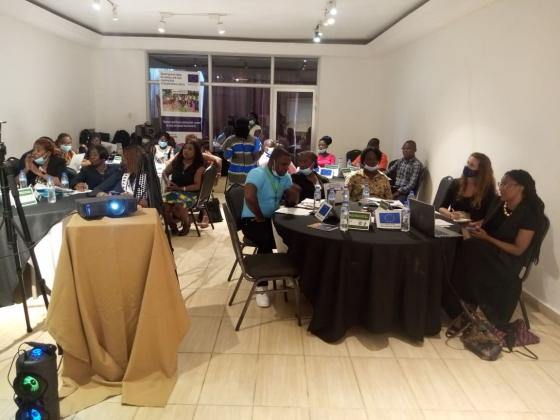EU, ActionAid Liberia Poised to Increase Women’s Land Rights Awareness in 4-Counties

EU, ActionAid stakeholders workshop held at a resort in Monrovia
-- Targets 30 Rural Communities for Women’s Land Rights Awareness
As part of a plan to increase women’s land rights visibility in four of Liberia’s 15 counties, ActionAid Liberia along with partners, with co-funding from the European Union, is poised to increase women’s land rights awareness in Sinoe, Grand Gedeh, Bong, and River Gee counties.
The project, under the title: “Securing Land Rights for Women and Rural Communities in South-Eastern Liberia”, targets 30 communities.
The project also aims to increase access to land rights for women and young people, strengthen community engagement in decision-making on land use and equip civil society organizations to provide sustainable advocacy for land sector reforms in Liberia.
European Union Delegation to Liberia Programme Manager for Climate Change, Rural Development, and Environment, Vera Kellen, said the EU considers secured land tenure as the pre-condition for sustainable investment and particularly considers it in Liberia as one of the contributing factors to peace.
Ms. Kellen said for the European Union, land rights have always been an issue across various countries and also in EU countries.
“For European Union, we look at land rights as part of our interventions to help citizens and the country to be more resilient to climate change, to develop wealth in forestry and agriculture which are two of the major areas EU is more concerned about for the people of Liberia,” Ms. Kellen said.
Globally, Ms. Kellen said, European Union has been supporting the issue of land rights for a long time through voluntary guidelines, responsible land governance, and land and fisheries tenure.
She said the EU is currently focusing on education, energy, growth, and agriculture, indicating that “none of these interventions can bear fruits without the people who live on the land knowing how to use the land and how to sustainably manage the land in the long run.
She said the EU has had lots of interventions on land rights before 2016, which focused on food security and has transitioned from it now and focusing is on land rights as a sector itself.
Ms. Kellen said the EU has seen so much effort by the government to reform the land rights sector of Liberia and positive development from various stakeholders, including civil society actors, land authority, and Legislature to move forward with the land rights sector and ensure that everyone can have ownership.
She added that the EU is committed to ensuring the implementation of the land rights Act, stating “EU supported civil society organizations to ensure the passage of the Act which was finally passed in 2018.”
The Country Director of ActionAid Liberia, Lakshmi Moore, said women’s land rights should not just be something to talk about to the Liberia Land Authority, but also able to ensure that the challenges women face and opportunities for women in the sector are something that the agenda is informed about and able to intensify.
Mrs. Moore said ActionAid Liberia is aware that the issue of land rights is not something that one organization is responsible for as the successful passage of the Act brought different actors together.
She said the ActionAid Liberia project is one part of a whole sector that is working to ensure the implementation of land rights.
Mrs. Moore said under this workshop, the goal is to bring together all the stakeholders including the Ministry of Gender, Children and Social Protection, Liberia Land Authority, Ministry of Justice, and peer NGOs to ensure everyone’s inputs and feedback and also inform stakeholders about impending activities of ActionAid.
James Pewee, Programme manager of EU land rights project, said increased access to land rights for women and communities will be done through strengthening civil society organizations, community based organizations, women and youth networks, community leaders, and members of community structures.
Mr. Pewee said the project will also provide legal aid to women and communities to claim and defend their land rights, and resources to support communities to undertake or complete their community self-identification process and technical support to smallholder farmers in project communities.
